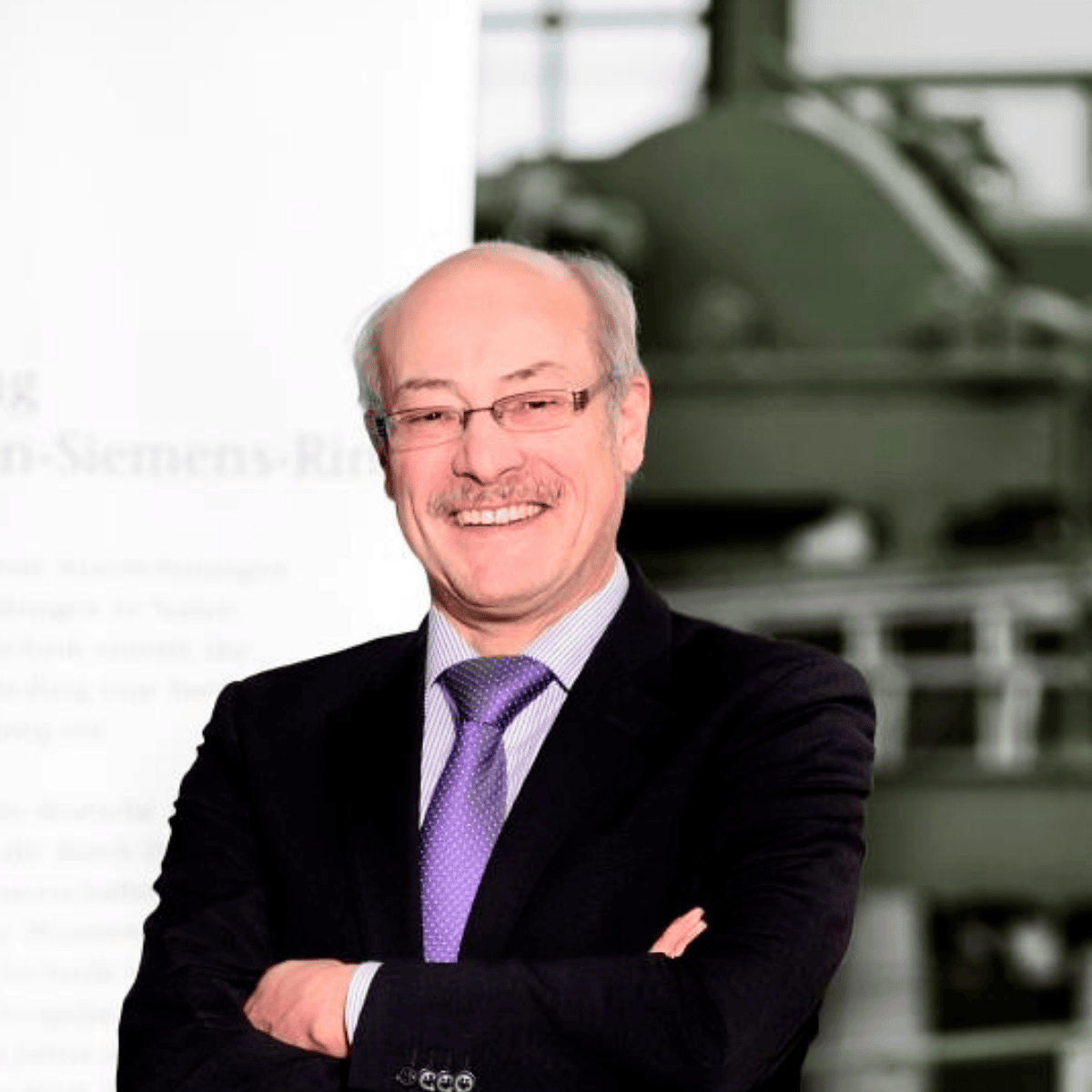Über die Preisträger:innen
Uğur Şahin * 19. September 1965 in İskenderun
Özlem Türeci * 6. März 1967 in Lastrup
Christoph Huber * 14. Februar 1944 in Wien
Katalin Karikó * 17. Januar 1955 in Szolnok
Der Stiftungsrat der Stiftung Werner-von-Siemens-Ring beschloss am 14. Dezember 2021 in geheimer Wahl, den „Werner-von-Siemens-Ring“ – Ehrenring für Verdienste um Naturwissenschaft und Technik – an Christoph Huber, Katalin Karikó, Uğur Şahin und Özlem Türeci zu verleihen: für die Erforschung, Entwicklung und Produktion effektiver mRNA-basierter Wirkstoffe.
Aufbruch in ein neues Zeitalter der Medizin
Die mRNA-Technologie bietet nicht nur zur Prävention und Behandlung von Viruserkrankungen enorme Entwicklungsperspektiven, sondern auch für die Vorbeugung und Immuntherapie von Krebserkrankungen, die Behandlung von Autoimmunerkrankungen, die Induktion von Allergietoleranzen oder die Behandlung von Erbkrankheiten. Der Schritt der mRNA-Technologie von der Theorie in die Anwendung hat die Welt in ein neues Zeitalter der medizinischen Praxis katapultiert.

„Uğur Şahin, Özlem Türeci, Christoph Huber und Katalin Karikó haben durch langjährige Grundlagenforschung an mRNA und durch ihre unternehmerischen Fähigkeiten den Menschen einen neuartigen Wirkstoff mit enormem Potenzial verfügbar gemacht. Dafür erhalten sie gemeinsam den Werner-von-Siemens-Ring.“
Joachim Ullrich
Vorsitzender des STiftungsrats zum zeitpunkt der Wahl
About Prof. Uğur Şahin
Prof. Uğur Şahin, M.D., Co-Founder and CEO of BioNTech, is a physician, immunologist and leader in the development of novel approaches to fight cancer and infectious diseases. Şahin is one of the world’s foremost experts on messenger ribonucleic acid (mRNA) medicines. He has pioneered several fundamental breakthroughs enabling the development of mRNA vaccines and other types of immunotherapies.
Sahin initiated and oversees “Project Lightspeed,” the historic development of the first mRNA vaccine for COVID-19, moving from lab and clinical testing to conditional approval within an unprecedented 11-month period. He also leads BioNTech’s research and development of neoantigen specific mRNA cancer vaccines which are individually tailored and produced on demand according to the profile of non-synonymous mutations identified by next-generation sequencing in patients’ tumors. Uğur Şahin is co-inventor of more than 500 filed patents applications and patents.
Şahin’s academic credentials include serving as a Full Professor in Translational Oncology & Immunology at Johannes Gutenberg University in Mainz, Germany, where he was the supervisor of more than 50 PhD students. He also holds the role of Chairman of the Scientific Management Board of the Helmholtz Institute for Translational Oncology (HI-TRON). Based on his contributions to scientific discovery, Dr. Şahin has received numerous awards and recognitions, including the German Sustainability Award, the Mustafa Prize, and the German Cancer Award. He is married to Prof. Özlem Türeci.
About Prof. Özlem Türeci
Prof. Özlem Türeci, M.D., Co-Founder and Chief Medical Officer of BioNTech, is a physician, immunologist, and cancer researcher with translational and clinical experience. Türeci has helped lead the discovery of cancer antigens, the development of mRNA-based individualized and off-the-shelf vaccine candidates and other types of immunotherapies which are currently in clinical development. Türeci leads the clinical development of BioNTech’s “Project Lightspeed,” the company’s successful effort to develop and distribute an mRNA-based vaccine against COVID-19, a historic achievement completed in less than one year.
Türeci previously served as CEO and Chief Medical Officer of Ganymed Pharmaceuticals AG, which she co-founded with Uğur Şahin and Christoph Huber. She is also a professor for Personalized Immunotherapy at the University Medical Center Mainz and the Helmholtz Institute for Translational Oncology Mainz (HI-TRON) and currently serves as President of the Association for Cancer Immunotherapy (CIMT) in Germany. She is a recipient of the German Sustainability Award, among other notable recognitions. Türeci is married to Prof. Ugur Sahin.
About Prof. Christoph Huber
Prof. Christoph Huber, M.D. is a co-founder of BioNTech and has served as a member of our Supervisory Board since 2008. Prof. Huber has more than 50 years of professional experience in hematology, oncology and translational immunology. Prof. Huber served as Chairman of the Department of Hematology and Oncology at the Johannes-Gutenberg University Mainz from 1990 to 2009 and, since 2009, has served as Chairman Emeritus of the Department of Hematology and Oncology.
Prof. Huber was a co-founder of Ganymed Pharmaceuticals AG, now a subsidiary of Astellas. He is an executive board member of CIMT and a board member of Ci3. From 2018 to April 2019, Prof. Huber served as a member of the supervisory board of TRON. Prof. Huber earned his M.D. at the University of Innsbruck.
About Prof. Katalin Karikó
Prof. Katalin Karikó is Senior Vice President RNA Protein Replacement Therapies at BioNTech SE since 2013. She is also a professor at University of Szeged and adjunct professor at the Perelman School of Medicine, University of Pennsylvania, where she worked for 24 years. During her decades-long research, she has been focusing on RNA-mediated mechanisms with the ultimate goal of developing in vitro-transcribed mRNA for protein therapy. She investigated RNA-mediated immune activation and co-discovered that nucleoside modifications suppress immunogenicity of RNA, which widened the therapeutic potentials of mRNA.
With her team at BioNTech she focused to improving the performance of non-immunogenic, nucleoside-modified mRNA that is used to create the mRNA-based COVID-19 vaccine.
For her achievement she received many prestigious awards, including the Japan Prize, Paul Ehrlich Award, the Gairdner Award, the Kovalenko Medal, the Breakthrough prize and the Lasker Award. She received her Ph.D. in biochemistry from University of Szeged, Hungary, in 1982.
Die Stiftung Werner-von-Siemens-Ring zeichnete 2022 gleich zwei bahnbrechende Leistungen in den technischen Wissenschaften aus: Dem Physiker und Nobelpreisträger Stefan Hell ist es gelungen mit einer neuartigen Technologie, der Superauflösungsmikroskopie, lebende Zellen auf molekularer Ebene zu beobachten. Er eröffnet den Lebens- und Materialwissenschaften eine Vielzahl neuer Erkenntnisse und erhielt dafür den Werner-von-Siemens-Ring. Hier erfahren Sie mehr über Stefan Hell.
